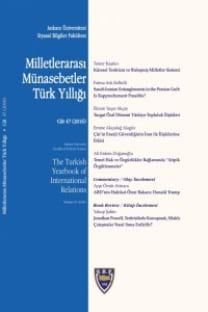Küresel Terörizm ve Birleşmiş Milletler Sistemi
Bu çalışmanın temel amacı, Birleşmiş Milletler Sisteminin uluslararası normların üretimi ve bu normların sistem içerisinde yayılması bağlamında sahip olduğu merkezi rolü, “küresel terörizmle mücadele” kapsamında değerlendirmektir. Soğuk Savaş sonrası dönemde teknolojik gelişmelerle birlikte küresel bir nitelik kazanan terörizm, 11 Eylül saldırıları ile birlikte uluslararası toplumun ana gündem maddelerinden bir tanesi haline gelmiştir. Bu durum uluslararası toplumun küresel terörizmle mücadeleyi şekillendirecek yeni normların oluşturması ihtiyacını da beraberinde getirmiştir. Soğuk Savaş sonrası dönemde, Birleşmiş Milletler Sistemi içerisinde özellikle Genel Kurul ve Güvenlik Konseyi, söz konusu ihtiyacı karşılamaya yönelik yeni normların oluşturulması bağlamında merkezi bir rol oynamıştır. Bunun yanı sıra yine bu organlar, söz konusu normların sistem içerisindeki aktörler tarafından benimsenmesine yönelik çeşitli mekanizmalar geliştirmiştir
Anahtar Kelimeler:
Küresel Terörizm, Birleşmiş Milletler Sistemi, Güvenlik, Norm Üretimi, Norm Sosyalizasyonu
Global Terrorism and the United Nations System
The main aim of this article is to evaluate the central role of the United Nations System in creating new international norms and their expansion into the international system. This central role will be examined in the context of “global counter-terrorism efforts”. Terrorism, which gained a “global” quality with the technological developments after the Cold War, became one of the top issues in the agenda of international society after the September 11 attacks. The international society needs to develop new international norms in order to counter global terrorism. In the post-Cold War period, especially the General Assembly and the Security Council have a central role in developing new international norms against global terrorism. Furthermore, these organs have developed new mechanisms which were meant to help the adoption of these norms by international actors in the system
- ISSN: 0544-1943
- Yayın Aralığı: Yıllık
- Başlangıç: 1960
- Yayıncı: Ankara Üniversitesi Siyasal Bilgiler Fakültesi Uluslararası İlişkiler Bölümü
Sayıdaki Diğer Makaleler
Temel Hak ve Özgürlükler Bağlamında Atipik Örgütlenmeler
Küresel Terörizm ve Birleşmiş Milletler Sistemi
Çin'in Enerji Güvenliğinin İran ile İlişkilerine Etkisi
Saudi-Iranian Entanglements in the Persian Gulf: Is Rapprochement Possible?
